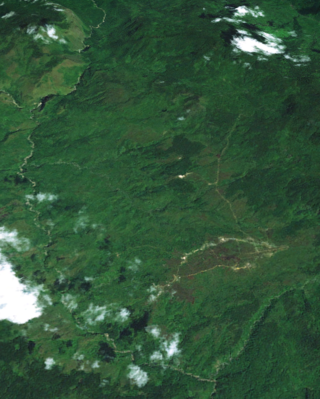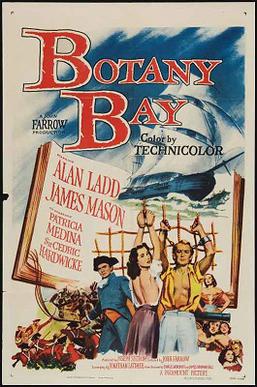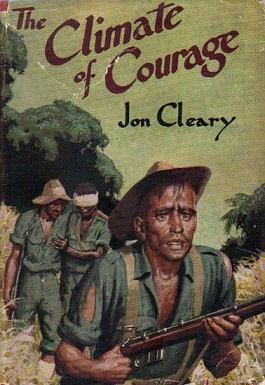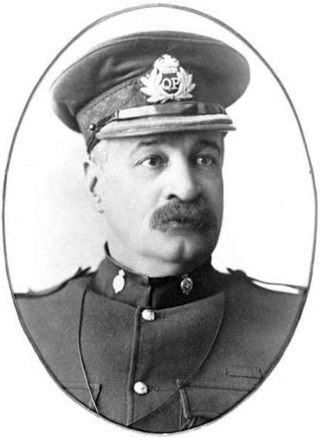Related Research Articles

Jedda, released in the UK as Jedda the Uncivilised, is a 1955 Australian film written, produced and directed by Charles Chauvel. His last film, it is notable for being the first to star two Aboriginal actors, Robert Tudawali and Ngarla Kunoth in the leading roles. It was also the first Australian feature film to be shot in colour.
This is a timeline of major crimes in Australia.
The following lists events that happened during 1966 in Australia.

Ronald Grant Taylor was an English-Australian actor best known as the abrasive General Henderson in the Gerry Anderson science fiction series UFO and for his lead role in Forty Thousand Horsemen (1940).
HMAS Tarakan (L3017) was a Mark III Tank Landing Ship, or LST(3), that served in the Royal Navy (RN) during 1945 and 1946 and Royal Australian Navy (RAN) from 1946 until 1954.

Australian native police were specialised mounted military units consisting of detachments of Aboriginal troopers under the command of White officers appointed by colonial governments. These units existed in various forms in colonial Australia during the nineteenth and, in some cases, into the twentieth centuries. From temporary base camps and barracks, Native Police were primarily used to patrol the often vast geographical areas along the colonial frontier in order to conduct raids against aboriginals or tribes that had broken the law and punitive expeditions against Aboriginal people. The Native Police proved to be a brutally destructive instrument in the disintegration and dispossession of Indigenous Australians. Armed with rifles, carbines and swords, they were also deployed to escort surveying groups, gold convoys and groups of pastoralists and prospectors.
Terrorism in Australia deals with terrorist acts in Australia as well as steps taken by the Australian government to counter the threat of terrorism. In 2004 the Australian government has identified transnational terrorism as also a threat to Australia and to Australian citizens overseas. Australia has experienced acts of modern terrorism since the 1960s, while the federal parliament, since the 1970s, has enacted legislation seeking to target terrorism.

Telefomin is a station town on the border of Sandaun and Western Provinces in Papua New Guinea. The town started during the Second World War after Mick Leahy was assigned to engineer an airstrip in 1944 for the United States for use against the Imperial Japanese Army forces based in New Guinea.

Botany Bay is a 1953 American adventure film directed by John Farrow and starring Alan Ladd, James Mason and Patricia Medina. It was based on a novel of the same name by Charles Nordhoff and James Norman Hall.
Kiaps, known formally as district officers and patrol officers, were travelling representatives of the British and Australian governments with wide-ranging authority, in pre-independence Papua New Guinea.

The Romantic Story of Margaret Catchpole, generally referred to as Margaret Catchpole, is a 1911 Australian silent film directed by Raymond Longford and starring Lottie Lyell. It is based on the true story of Margaret Catchpole, an adventurer and convict.
Australia's Own is a 1919 Australian silent film set in New Guinea, with footage shot in the Yule Island area near Port Moresby. It is a lost film.
Rex Rienits was an Australian writer of radio, films, plays and TV. He was a journalist before becoming one of the leading radio writers in Australia. He moved to England in 1949 and worked for a number of years there. He later returned to Australia and worked on early local TV drama.

The Climate of Courage is a 1954 novel by Australian writer Jon Cleary. It was his fifth published novel. It is set during World War II and involves a group of Australian soldiers who have returned from service in the Middle East.

Frederic Charles Urquhart was a Native Police officer, Queensland Police Commissioner and Administrator of the Northern Territory.

Colonist was a general cargo and passenger schooner built in 1861 at Dumbarton Scotland by Denny & Rankine. It spent nearly 30 years plying the Western Pacific-based out of Sydney. It wrecked and later re-floated on the remote Elizabeth Reef 550 km from New South Wales, as well as being involved in the gold rushes. Its master was murdered before it was finally involved in a collision in Sydney Harbour, in which it was sunk.

Operation Oaktree was a Dutch military operation in Dutch New Guinea during World War II. Under the command of Captain Jean Victor de Bruijn, some 40 soldiers operated in the highland region of Western New Guinea for more than two years between December 1942 and July 1944, handled by the Netherlands East Indies Forces Intelligence Service, with Australian assistance.

William Edington Armit was a soldier, sailor, Native Police officer in the British colony of Queensland, explorer, naturalist and colonial administrator in British New Guinea. Armit is regarded as one of the most violent officers of the paramilitary Native Police force.
References
- ↑ "New Guinea Patrol Officer Killed By Natives". The Sun-Herald . Sydney: National Library of Australia. 8 November 1953. p. 1. Retrieved 9 July 2015.
- ↑ "N.G. OFFICER MISSING". The Sydney Morning Herald . National Library of Australia. 10 November 1953. p. 1. Retrieved 9 July 2015.
- ↑ "REPORT ON N.G. MASSACRE". The Sydney Morning Herald . National Library of Australia. 2 December 1953. p. 5. Retrieved 9 July 2015.
- ↑ "THIS TRANSFORMATION HAS GIVEN "BLACK JITTERS"". The Courier-Mail . Brisbane: National Library of Australia. 9 December 1953. p. 2. Retrieved 9 July 2015.
- ↑ "Death sentence for Telefomin natives". The Advocate . Burnie, Tas.: National Library of Australia. 10 August 1954. p. 5. Retrieved 9 July 2015.